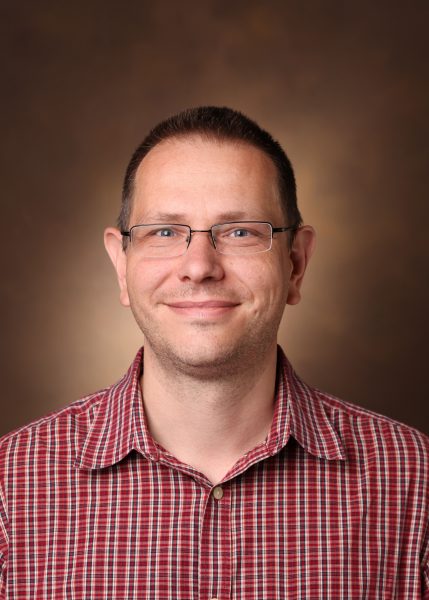Vanderbilt University School of Medicine Basic Sciences has launched the Center for Applied Artificial Intelligence in Protein Dynamics, which is focused on the intersection of artificial intelligence, machine learning and macromolecular mechanism. It will be led by Hassane Mchaourab, who holds the Louise B. McGavock Chair in the Department of Molecular Physiology and Biophysics.

Proteins are one of the most important macromolecules of biology, and they often change shape to carry out their biological functions. To develop therapeutic treatments that work on them, researchers first must understand their three-dimensional structures and how they work in the body. Recent AI algorithms, such as AlphaFold, have revolutionized the field of protein structure prediction and design, representing a first wave of AI-based methods that already are working to provide transformative tools for helping understand protein networks.
“We are living in an exciting time where we have both immense data and computational tools to make discoveries in structural biology at a speed that was inconceivable before,” said John Kuriyan, dean of the School of Medicine Basic Sciences. “Leveraging these emerging tools through the Center of Applied AI in Protein Dynamics, while synergizing with existing expertise across Vanderbilt and Vanderbilt University Medical Center, has the potential for driving breakthroughs that could broadly impact human health.”
Recent publications, including from Mchaourab and Jens Meiler, research professor of chemistry, successfully leveraged AI methods to capture proteins in the shape-shifting act. These contributions, published in the journals PNAS, PLOS Computational Biology and eLife, offer new information on the mechanisms of genetic diseases and expand available approaches to the discovery of therapeutics.

At its outset, the center will recruit experts in AI and machine learning to adapt and create computational approaches to develop an understanding of protein energy landscapes that mediate shape changes; leverage new information to identify new drug candidates more precisely; develop graduate training programs in AI-centric computational protein structure and dynamics; and conduct outreach programs that increase awareness of AI’s role in shaping society. The programs include bringing the latest AI into Nashville schools, especially for students from underrepresented minorities in STEM who may have limited exposure to AI.
The center will include faculty in the protein structure and dynamics subspace of emerging AI technologies. It will train students and postdoctoral fellows affiliated with the School of Medicine Basic Sciences, the Data Science Institute, the College of Arts and Science, the School of Engineering and VUMC.
“We live in a protein-based world. When things go right, they go right because your proteins are working correctly. And when things go wrong, it is usually because something is wrong with one or more of your proteins,” said Charles Sanders, vice dean of the School of Medicine Basic Sciences who holds the Aileen M. Lange and Annie Mary Lyle Chair in Cardiovascular Research and is president of the Protein Society. “This is why 99 percent of all drugs target proteins.”
Mchaourab founded the Program in the Molecular Basis of Genetic Diseases in collaboration with Meiler and Tony Capra. The program, which will be folded into the new center, investigates the links among genetic mutations, protein function and the way disease presents in a patient.
“The amazing advances in AI and machine learning that are transforming human communication are also being used to understand and design biological machinery. We can ‘write’ with the language of the genetic code,” said Mchaourab, whose research is focused on illuminating the principles that govern protein dynamics. “This area of our work in the Center for Applied AI in Protein Dynamics has unlimited possibility to improve human health.”
